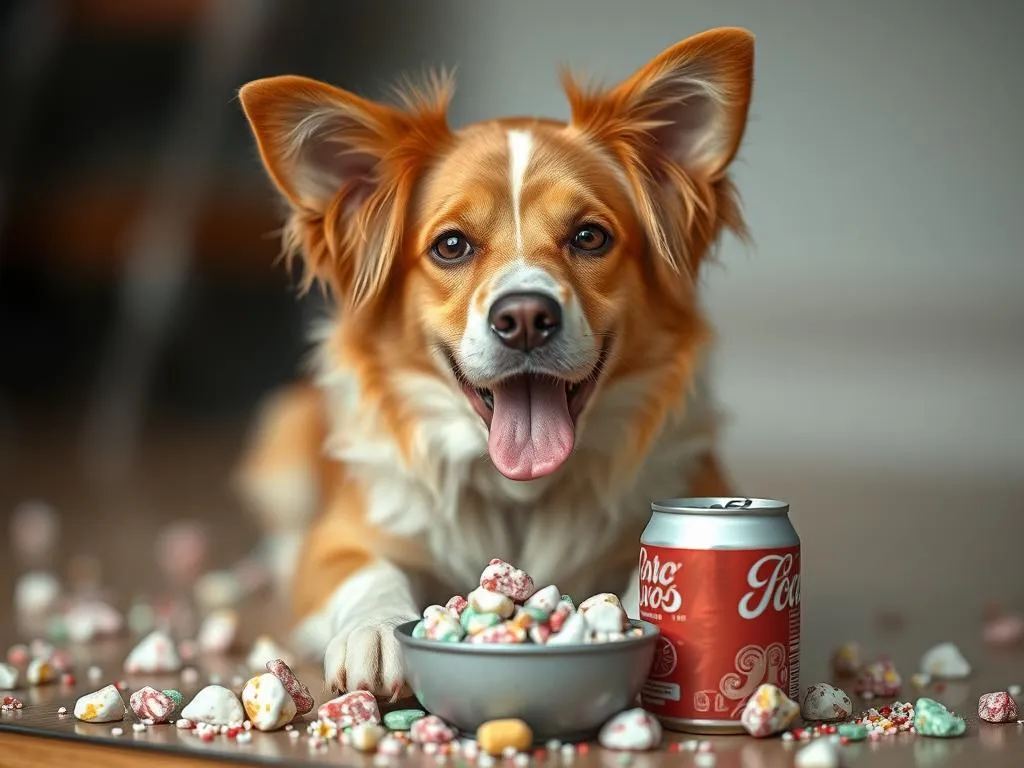
Introduction
Proper dog nutrition is essential for the overall health and well-being of our furry friends. Just as humans benefit from a balanced diet, dogs require specific nutrients to thrive. With the rise of human food-sharing culture, many pet owners often wonder which human foods are safe for their canine companions. One such curiosity revolves around the question: can dogs eat Pop Rocks? This article aims to address the safety of Pop Rocks for dogs while providing insights into canine nutrition and pet health.
Understanding Dog Nutrition
Basics of Canine Nutrition
Dogs are omnivores, which means they can consume a variety of foods, but their nutritional needs differ significantly from those of humans. A balanced canine diet consists of:
- Proteins: Essential for growth, maintenance, and repair of tissues.
- Fats: Provide energy and support cell structure.
- Carbohydrates: Offer a source of quick energy and aid digestion.
- Vitamins: Vital for metabolic functions and overall health.
- Minerals: Necessary for bone health and various bodily functions.
Understanding these essential nutrients helps pet owners provide a well-rounded diet that supports their dog’s health and vitality.
Common Dog Food Ingredients
Most commercial dog foods contain a combination of meat, grains, vegetables, and added vitamins and minerals. When selecting dog food, it is crucial to read the ingredient list carefully. Look for whole food sources and avoid foods high in fillers, artificial preservatives, and by-products. The quality of the ingredients can significantly impact your dog’s health and longevity.
The Role of Treats in a Dog’s Diet
Treats can play an important role in a dog’s diet, serving as rewards during training or simply as a way to show affection. However, treats should only make up about 10% of a dog’s daily caloric intake. When choosing treats, opt for those that are nutritious and free from harmful additives. Healthy options include:
- Fruits and vegetables (like carrots or apples)
- Commercially prepared dog treats with quality ingredients
- Homemade treats made from safe, dog-friendly ingredients
Exploring Pop Rocks
What Are Pop Rocks?
Pop Rocks are a popular candy known for their unique popping sensation. When exposed to moisture, the tiny bubbles of carbon dioxide trapped within the candy burst, creating a crackling and popping sound. While they may be a fun treat for humans, the ingredients in Pop Rocks can raise concerns for dog owners.
Nutritional Profile of Pop Rocks
Pop Rocks are primarily composed of sugar, artificial flavorings, and colorings. Here’s a breakdown of their nutritional components:
- Sugar Content: Pop Rocks contain high levels of sugar, which can lead to obesity, dental problems, and other health issues in dogs.
- Artificial Ingredients: Many varieties of Pop Rocks include artificial colors and flavors that can be harmful to dogs.
Overall, the ingredients found in Pop Rocks do not provide any nutritional benefit for dogs and can pose potential health risks.
Can Dogs Eat Pop Rocks?
Safety Concerns
When considering whether dogs can eat Pop Rocks, several safety concerns come into play.
- Choking Hazard: The popping sensation of Pop Rocks may cause dogs to panic or swallow them whole, leading to choking.
- Gastrointestinal Issues: The high sugar content can cause gastrointestinal upset in dogs, leading to symptoms like diarrhea or vomiting.
- Artificial Ingredients: Many artificial flavors and colors can be harmful to dogs, potentially causing allergic reactions or other health issues.
Given these concerns, it is best to avoid giving Pop Rocks to dogs altogether.
Signs of Distress in Dogs After Eating Pop Rocks
If a dog accidentally consumes Pop Rocks, pet owners should monitor for signs of distress, which may include:
- Vomiting
- Diarrhea
- Lethargy
- Abdominal pain
- Excessive drooling
If any of these symptoms occur, it is crucial to contact a veterinarian for guidance.
Alternatives to Pop Rocks
Safe Treat Options for Dogs
Instead of Pop Rocks, consider these dog-safe treat options that can provide enjoyment without the risks:
- Carrots: Crunchy and low in calories, carrots are a great dental treat for dogs.
- Peanut Butter: A favorite among dogs, peanut butter is high in protein and healthy fats—just ensure it’s xylitol-free.
- Pumpkin Puree: Packed with fiber and nutrients, pumpkin can be a tasty addition to your dog’s diet.
- Commercial Dog Treats: Look for high-quality brands that prioritize natural ingredients.
Engaging Your Dog with Fun and Safe Activities
Beyond treats, keeping dogs entertained and mentally stimulated is vital for their well-being. Here are some fun and safe activities:
- Interactive Toys: Toys that dispense treats can provide mental stimulation and encourage play.
- Puzzle Games: These challenge dogs to figure out how to get their reward, providing both exercise and mental engagement.
- Training Sessions: Teaching new tricks or commands can strengthen the bond between you and your dog while keeping them mentally sharp.
Conclusion
Understanding dog nutrition is crucial for the health and happiness of our canine companions. While the question can dogs eat Pop Rocks? may arise from curiosity, the answer is no—Pop Rocks pose several risks to dogs. Instead, pet owners should prioritize a balanced diet and opt for safe, nutritious treats that contribute positively to their dog’s health. Always consider your dog’s nutritional needs and make informed decisions when it comes to their diet.
FAQs
Can dogs have any kind of candy?
While some candies may be safe in small amounts, most candies, including chocolate, sugar-free candies (containing xylitol), and those high in sugar, are dangerous for dogs. Always exercise caution before sharing any human treats with your pet.
What other human foods are dangerous for dogs?
Several common human foods can be toxic or harmful to dogs, including:
- Chocolate
- Grapes and raisins
- Onions and garlic
- Avocado
- Macadamia nuts
How can I find the best treats for my dog?
When selecting treats for your dog, consider the following tips:
- Look for natural ingredients without additives or preservatives.
- Choose treats that are appropriate for your dog’s size and dietary needs.
- Consult your veterinarian for recommendations tailored to your dog’s health.
By prioritizing your dog’s nutrition and being mindful of what they consume, you can help ensure their long, healthy, and happy life.









